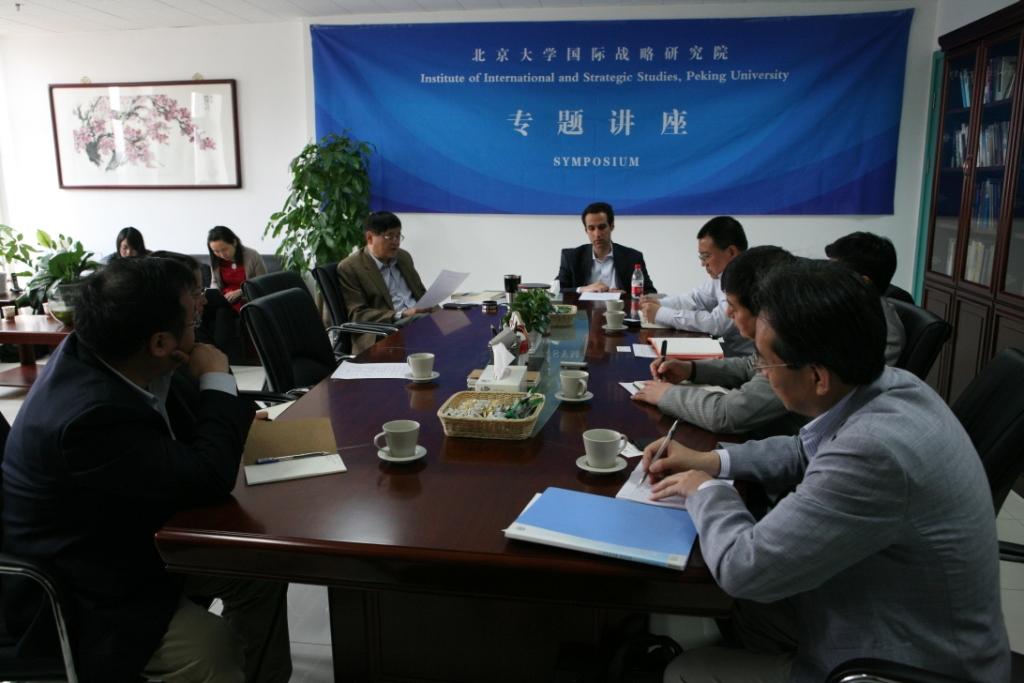On May 6th, 2014, Jeffery Mankoff, Deputy Director of Russia and Eurasia Program, Center for Strategic and International Studies (CSIS), paid a visit to the Institute of International & Strategic Studies (IISS), Peking University (PKU) and gave a special report at a symposium. The symposium was hosted by Wang Jisi, President and Professor of IISS and attended by Guan Guihai, Executive Vice President and Professor of IISS, Yu Tiejun and Gui Yongtao, Assistant Presidents and Associate Professors of IISS, Associate Professor Wu Bingbing, Special Research Fellow of IISS, Qian Xuemei, Associate Professor of IISS, and Liao Zhengrong, Standing Vice Director of the Institute of Peace and Development, Chinese Academy of Social Sciences (CASS).

Dr. Mankoff highlighted the issue of Eurasian integration and discussed the position of the parties involved. He pointed out that all the major powers have a significant impact on Eurasian, yet they and various forces within the region have an unbalanced political and economic agenda.
Dr. Mankoff pinpointed that the important fulcrum of US Eurasian policy is that the US Military plays a dominant role in Afghanistan. Since the Bush administration, the strategy of the US is to connect Central and South Asia and address a range of issues, such as democratization, anti-terrorism and energy in the region. The to-do list is so long that it requires a lot of investment in political and economic fields. For Russia, the geographically largest and most powerful country in Eurasia, it is particularly important to for it to build a supranational mechanism. Since the 21st century, there is a continuous effort in building a new integrated Eurasia, which is similar to imitation of the European Union. However, in terms of ideology, Russia may have some advantages in a short term, and but it will face challenges in a long term. China is also actively involved in Eurasia integration, which is clearly signaled by President Xi Jinping's visit to Central Asia last year. China faces both opportunities and challenges during its interactions with Eurasian countries, for that it urgently seeks to safeguard its own interests, especially the territorial integrity, while its sea power is weak and it lacks experience of safeguarding overseas interest.
Dr. Mankoff noted that there is an idea in the US diplomatic community that China and the US have similar strategic interests in the region, while China and Russia are far less interdependent than before. He also pointed out that many challenges in the region do not come from the international level, but from the domestic politics, especially disputes caused by scarcity of resources. As outside forces to some extent, China, the US and Russia should avoid relationship disharmony or friction due to regional conflicts.

In the Q & A session, Dr. Mankoff answered questions on different definitions of Eurasia, the European Union's strategy for Eurasia, Russian elites' views on politics in neighboring countries, and patterns in Central Asia and Afghanistan etc. He pointed out that major powers like China, the US, Russia and India have different views on the definition of the region and the priority of interior problems in the region. In addition, the important influence of Iran and Turkey on the region should not be ignored. In the short term, Russia is not able to contain the trend that former Soviet countries "defected” to the West. But Europe also has challenges on accepting these new members from the East.

